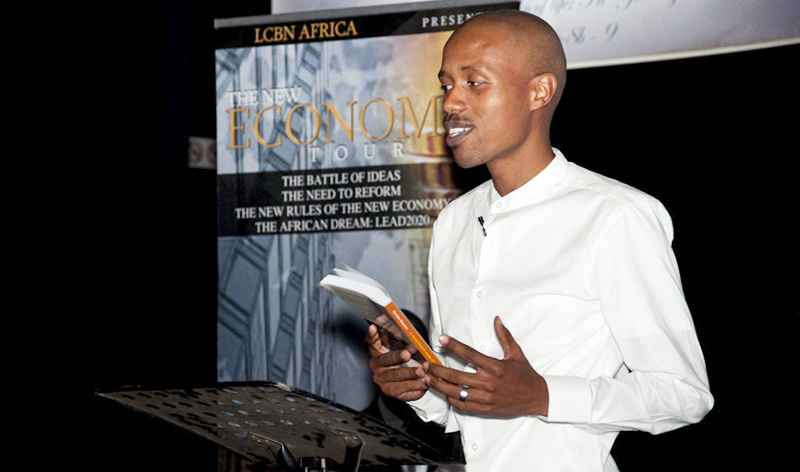By Lester Sigauke
South Africa needs a new economy. And the way to get there is to build an entrepreneurial culture. This is the message that author, entrepreneur and speaker Thabo Mahlobo shared at a talk at Rhodes University on Saturday 30 September as part of a tour promoting his book The New Economy: Ancient Hope for Modern Economies. Mahlobo’s book applies wisdom from the Bible to the challenges posed by South Africa’s current economic crisis.
Highlighting that excellent business opportunities emerges from recessions, Mahlobo spoke about South Africa’s recent recession. During times of recession there should therefore be a strong effort to encourage and support would-be entrepreneurs because their innovation and opportunism has the potential to drive the economy and create jobs.
Mahlobo challenged us to foster a culture of entrepreneurship in our homes, schools and university. He demonstrated that an entrepreneur’s knowledge and skills are surface-level characteristics buoyed by inner traits like a positive attitude, innovative thinking styles, a positive self-image and business acumen. We should not invest in knowledge and skills alone but also nurture character traits which drive an entrepreneurial culture.
Evidence suggests that entrepreneurial activity within South African communities is hampered by a paralysing fear of failure. The fear-of-failure rate of 30% among South African entrepreneurs compares poorly to other African countries such as Senegal and Botswana which have much lower fear-of-failure rates. South Africans must work together in order to eradicate this fear.
Mahlobo emphasised that it is important to recognise that the battle for an entrepreneurial culture is not won or lost in one’s pocket; the battle is in one’s mind. This echoes a well-known Bible verse, Romans 12:2, which says, “Do not conform to the pattern of this world, but be transformed by the renewing of your mind.”
He highlighted that the pattern of this world is to see entrepreneurship as being about making money as opposed to benefiting communities. In order for us to lead communities out of recessions it is paramount that we are not misled by schools of thought that present a view of entrepreneurship that puts human wants, needs and glory at the centre. Mahlobo used the example of the exponential rise of taverns and shebeens within our communities.
Although these activities can generate economic activity and may satisfy bankers’ desires for cash flow, this is not an activity that leads to wholesome and healthy communities. When we create a Biblical culture of entrepreneurship we are able to transform the way people think, we are able to foster traits that enable people to see opportunities in economic crises and not just problems, and we are able to overcome barriers to activity such as self-doubt due to negative self-image. Through building such an entrepreneurial culture, we are better equipped to navigate our communities and leaders out of poverty and into prosperity with a purpose.
The talk was followed by a panel discussion featuring Thabo Mahlobo, his business partner and wife Nthabiseng and local entrepreneurs James Jepp (Insight Technologies) and Tinashe Jani (Ubuntu Ride, Ubuntu Foods and Study263). The discussion revolved around successfully translating business opportunities into profit, and helping individuals prepare for pitches to potential investors and funders. On the day after the talk, Mahlobo held an Influencers’ Dinner at which leaders from the Grahamstown church, education and business sectors (including
Richard Gaybba from the GBF) discussed ways in which to transform the Grahamstown economy. It is hoped that we will be able to build partnerships that will apply the principles from The New Economy to grow a new generation of entrepreneurs.
Should you wish to find out more about Thabo Mahlobo or buy a copy of The New Economy, feel free to contact Lester Sigauke at car.chairperson@gmail.com.


